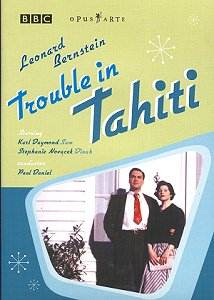I suspect Bernstein would have approved of this excellent
TV realisation of his troubled early chamber opera, Trouble in Tahiti.
It was broadcast by the BBC in 2001 (during Christmas, if memory serves)
and its appearance on DVD is most welcome, particularly given the useful
extras.
For such a short work (40 minutes) it packs an awful
lot in, though I suspect its brevity has led to programming problems
in the opera house. Quite simply, what do you put with it? It was, according
to Bernstein authority Humphrey Burton, originally mounted in a double
bill with Weill’s Threepenny Opera, a capitalist satire to which
that Bernstein acknowledged a debt. That production, for various reasons,
was not a success, and the opera faded into obscurity. The composer
had always intended to add two more short operas, making a triple bill
in the manner of Puccini’s Il Trittico, but only managed A
Quiet Place in 1983, though this suffered a similar fate to Tahiti.
In an ironic way, the work has found its true home
on television. Though at its dark heart lies a troubled marriage and
neglect of a child’s emotional needs (reflecting Bernstein’s own childhood),
the broader themes are of consumerism, materialism and the great ‘must
have’ post-war American dream. This is summed up in the world of TV
(escapism, advertising etc) and director Tom Cairns has brilliantly
exploited the parallels. He beautifully recreates ’50s American suburbia,
and in the opening number Breakfast in the Little White Dream House,
he pans his camera round the neighbourhood, cuts cinematically in and
out of the dwellings and generally encapsulates the whole suburban ethos
probably more effectively than could be done on stage. The whole production
moves along in this way, with sharp editing and clever synchronisation
of the score with the visual images.
Cast wise, this is basically a two-hander, with an
ingenious contribution from The Trio, a sort of Greek
chorus of three, who keep cropping up throughout the action in various
guises (gardener, secretary, milkman, ‘shrink’) to comment on the action.
It is a Brechtian stage device superbly exploited on the screen. In
the lead roles of Sam and Dinah (named after Bernstein’s father and
an aunt), Stephanie Novacek and Karl Daymond are excellent. He is the
burly, unfeeling head of the house, who cares more about working out
than whether his marriage is on the rocks. She pours out her soul to
the psychiatrist, then escapes into the celluloid world of the latest
romantic movie hit, Trouble in Tahiti. Her ‘shrink’ couch aria
I was standing in a garden, is very moving, with a gorgeous central
theme that sounds like Somewhere in embryo. I cannot imagine
either part done better.
As for the music, this is as infectious a score as
Bernstein penned. From the pizzazz of the jazzy opening Prelude, through
Stravinskian spikiness to Coplandesque lyricism, it has all the inventiveness
you would expect from the young American firebrand. It is superbly brought
to life by Paul Daniel, an ideal conductor for this job, and his orchestra
clearly enjoy every minute, as well they might.
The disc is made up to 75 minutes by some useful extras.
There is an introduction to the opera, with cast interviews and backstage
glimpses. There is more substantial interview with Daniel (entitled
A very testing piece) and, best of all, a 20 minute talk by Humphrey
Burton entitled Not particularly romantic, where he takes us
through all the main aspects and themes of the piece. Though recording
quality and diction are excellent, the BBC has still included a full
libretto in the well-produced booklet.
It may be a short work, bur this piece packs more in
than many a tedious three-hour haul. The BBC’s handsome release may
hopefully get the opera to the wide public it deserves, as there is
no doubting its importance in the Bernstein canon. Highly recommended.
Tony Haywood
